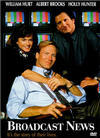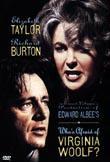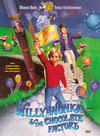 Broadcast News (James L. Brooks, 1987)
Broadcast News (James L. Brooks, 1987)Given how much I hated Spanglish, I guess it's a little odd that I'd want to see this. But I didn't hate As Good as It Gets (although I kind of worry that I might in hindsight if I ever saw it again), and I guess I wanted to prove to myself that Brooks doesn't just make smug movies about white liberal guilt. This is, in ways, a smug movie about white liberal guilt, but it's not nearly as condescending as Spanglish, and the expression of liberal guilt is filtered through a prism (the world of TV news) that Brooks seems to know more about. Ultimately, for all its flirtations with dealing with the changing landscape of TV news, this is a movie about a love triangle, and that's where Brooks does his best work. He's helped by great performances from Holly Hunter and Albert Brooks, and a nice balancing act by William Hurt, making his character emblematic of the problems in TV journalism while not turning him into a total asshole. I was sort of surprised to see that this had been nominated for so many Oscars, since it's a fairly safe romantic drama (although the ending gets points for defying expectations), but I guess that's the kind of thing that Academy members, then as now, really like.
 The Rapture (Michael Tolkin, 1991)
The Rapture (Michael Tolkin, 1991)This is an allegedly underrated gem that I had never heard of until its relatively recent DVD release, when I saw it praised in several places. It's got Mimi Rogers in a great performance as a hedonistic telephone operator who finds Jesus and awaits the titular spiritual event. Also David Duchovny in an awesome mullet, for whatever that's worth. Very bizarre mix of explicit sex scenes and ruminations on religion, with strange pacing and an ambivalent message. It's striking to see a film with recognizable stars and good production values that takes on religion so directly and so ambitiously, not preaching evangelism or atheism, just exploring ideas. I'm still not quite sure if it was a good movie, but it gave me a lot to think about, and approached the subject matter in a way I doubt a movie at its level would be able to today.
 Who's Afraid of Virginia Woolf? (Mike Nichols, 1966)
Who's Afraid of Virginia Woolf? (Mike Nichols, 1966)After seeing Closer and reading all about Nichols' earlier, better dramas of sexual politics, I added both this and Carnal Knowledge to my NetFlix queue. Like Closer, this is a movie about unpleasant people doing unpleasant things, although it does have more genuine character development and narrative urgency than Closer did. Still, I found a lot of it overwrought and so much of the dialogue just consists of talking in circles. By the end I found myself just exhausted, and not in a good way, although the performances are all excellent. Maybe it's the stage origins, but, like Closer, this struck me as a better acting exercise than a movie.
 Willy Wonka & The Chocolate Factory (Mel Stuart, 1971)
Willy Wonka & The Chocolate Factory (Mel Stuart, 1971)I'm sure I've seen this movie (or various snippets of it on TV) a dozen times, but I wanted to refresh my memory before seeing the remake, even though Tim Burton stridently denies that his movie is a remake. It's interesting that this was neither a critical or commercial hit when it was first released. I can see how Roald Dahl might not have loved the changes from his book, and some of the songs are pretty unmemorable, but there's a lot of fun excitement for kids, and the underlying creepiness for adults. Everyone knows how creepy Wonka is (the scene in the office with everything cut in half always freaked me out the most as a kid), but what struck me more watching this again is how much Wonka is a dick. I mean, he jerks Charlie around the whole time, tricks him, yells at him, and then expects him to take over the whole weird candy factory with all its secret passages and Oompa Loompas and all? Kind of presumptuous, I think.
3 comments:
Gotta agree with you about Willy Wonka. In fact, one of the things I've always loved about the movie is that while the book clearly sides with Wonka and itself presents (sometimes rather dubious and unsettling) morals, the movie is clearly aware that he's a sadistic nut and lets the audience judge for themselves about Wonka's sick method for teaching kids lessons.
I thought I remembered you being a big fan of Broadcast News, because didn't you recommend the movie to me? I swear it was you.
Yeah, Virginia Woolf is a bit stagey (it's worse because they try too hard to make it cinematic, and it doesn't come off) but come on, there's more to like than just the performances... there's the play itself!
I think this just adds to my feeling that Nichols is really a stage/actors' director, no matter how much people may gush about how cinematically brilliant The Graduate is.
i remember my dad rented rapture a long ass time ago, probably when it first came out on dvd. not what we were expecting but i liked it upon revisiting it years later.
but i also totally agree about wonka: the guy was an asshole. i just watched the movie a few weeks ago to prepare for the "new interpretation" of the book, and i kinda forgot how mean wonka is...but you gotta love the rachmaninov bit.
on another note, though, i am thoroughly stoked to see the new one but i just watched the trailer again and i am kinda worried--all of johnny depp's lines were really lame. i am praying that it was just a bad cut.
I have a sort of blind spot when it comes to Tim Burton - I even liked Planet of the Apes and Mars Attacks! - so I'm sure I'll like his version no matter what. The commercials do seem a little off in places, but I trust in Burton, Depp and screenwriter John August (who also wrote Big Fish).
Katie, you're right that the play itself is something in Virginia Woolf, but honestly I found so much of the dialogue so circuitous and unilluminating that by the end it could barely hold my interest. There are discrete moments - certain lines and monologues - that are really brilliant, but overall I thought it was incredibly bloated.
Post a Comment